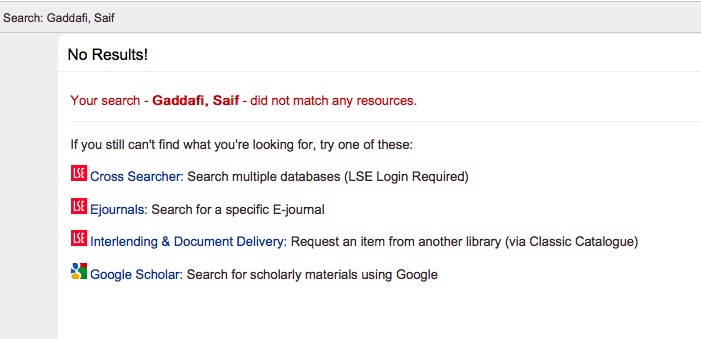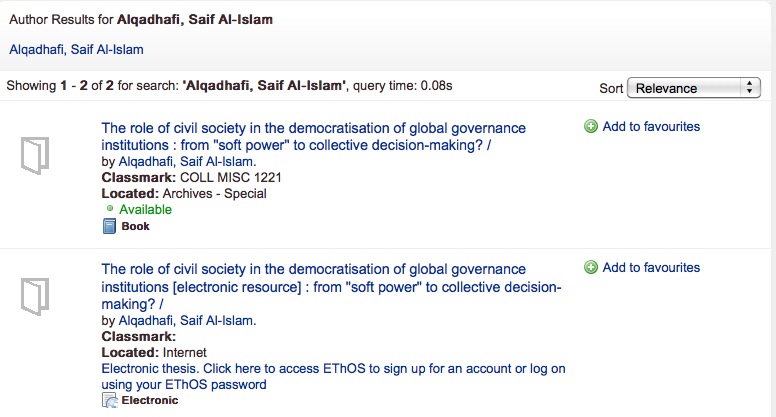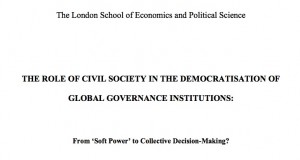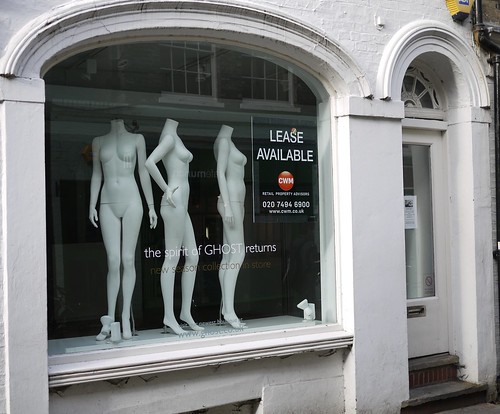Lovely rant by Simon Jenkins about LSE.
With felicitous timing, London's Royal Court theatre is staging Richard Bean’s hilarious if chaotic play, Heretic, about a university department eager for a grant from a multinational company and ready to suppress academic rigour to do so. It is clearly based on the University of East Anglia and climate change, but the words LSE and Gaddafi could be substituted throughout.
The global-warming sceptic, played by Juliet Stevenson, is ostracised and driven to madness by her colleagues, as her professor argues that their department is merely a unit to “service clients … a virtual budget centre providing tools to the market”. Eager for money, he quotes a Chinese proverb: “Man must stand for long time with mouth open before roast duck fly in.”
For the LSE, Gaddafi of Libya was pure roast duck. Journalists trawling through the recent jobs, contacts and pronouncements of LSE academics, including directors Lord Giddens and Sir Howard Davies – who has now resigned – have been aghast. Despite references to “the context of the times”, the story is of a respected academic institution apparently in mesmerised thrall to a dictator, and actively participating in sanitising his image.
Gaddafi was seen praised by LSE luminaries in a cringe-making video link as “the world’s longest serving leader”. His son, Saif al-Islam, settled in a north London palace to write an LSE PhD and dispense trips and contracts. He was declared as being committed to “democracy, civil society and deep liberal values” and was even invited to give the Ralph Miliband memorial lecture, an unusual honour for any student. His appreciation was swift. The university accepted a £1m contract to train 400 regime-approved “future leaders” from Libya. The mind boggles at it all.
It does indeed look as though LSE had lost its ethical bearings. But so do most universities when they get drawn into the reality distortion field that surrounds large bodies of money. The Divinity School in Cambridge was built with money from the Hinduja brothers. And Oxford’s Said Business School was built with money from a Syrian arms dealer. American universities are even worse — largely because they are better at fundraising.
I have a friend who was, for a time, deputy head of a major college and whose portfolio included fundraising. He hated it, and once said that, after a day’s schmoozing with potential donors, he felt physically dirty and had to take a shower when he got home. Another prominent academic friend resigned from the Mastership of an Oxbridge college because he couldn’t stand the social and ethical obligations of fundraising.
You don’t have to go to the extreme of believing that “behind every fortune lies a crime” to concede that truly untainted money is very rare. As state funding continues to evaporate, the pressures on universities to prostitute themselves in order to obtain donations from rich individuals will intensify. So we will see more of the ethical doublethink practised by LSE and other elite universities as they pocket the loot while claiming that research priorities and academic values are entirely untouched by theiir mendicancy. It’s nauseating but — hey — ivory towers are expensive to maintain.







